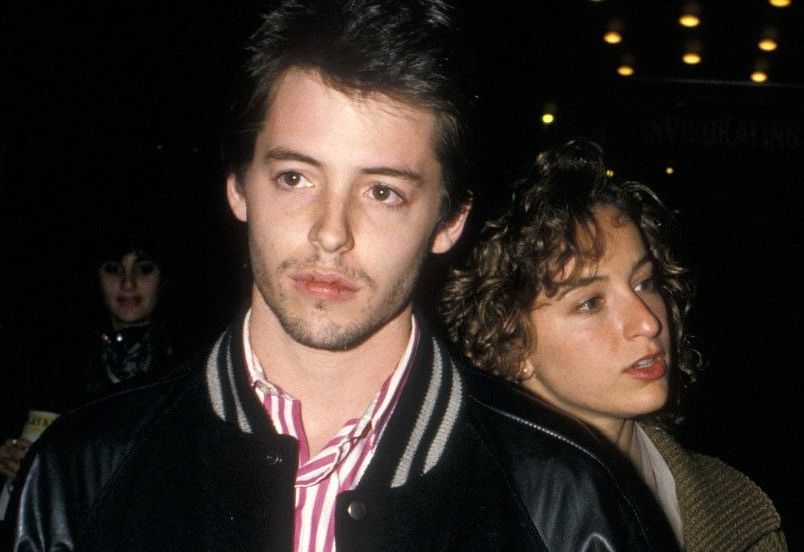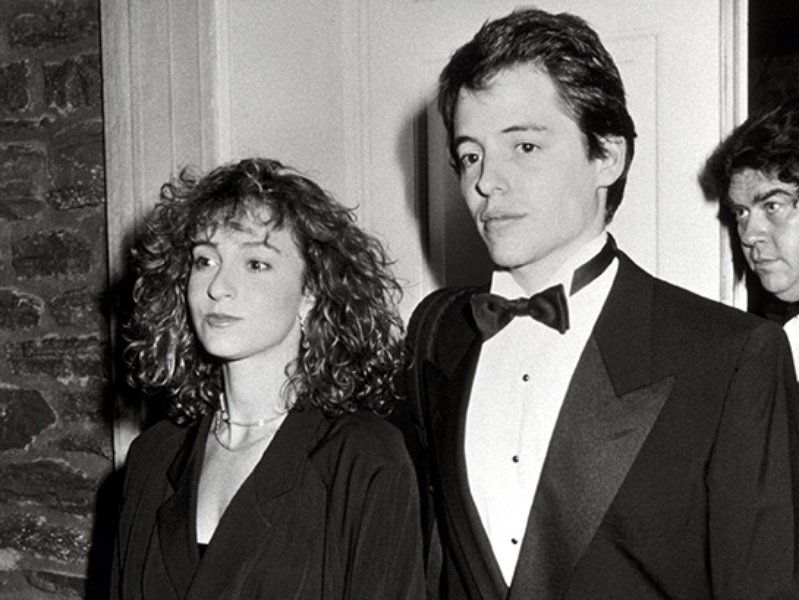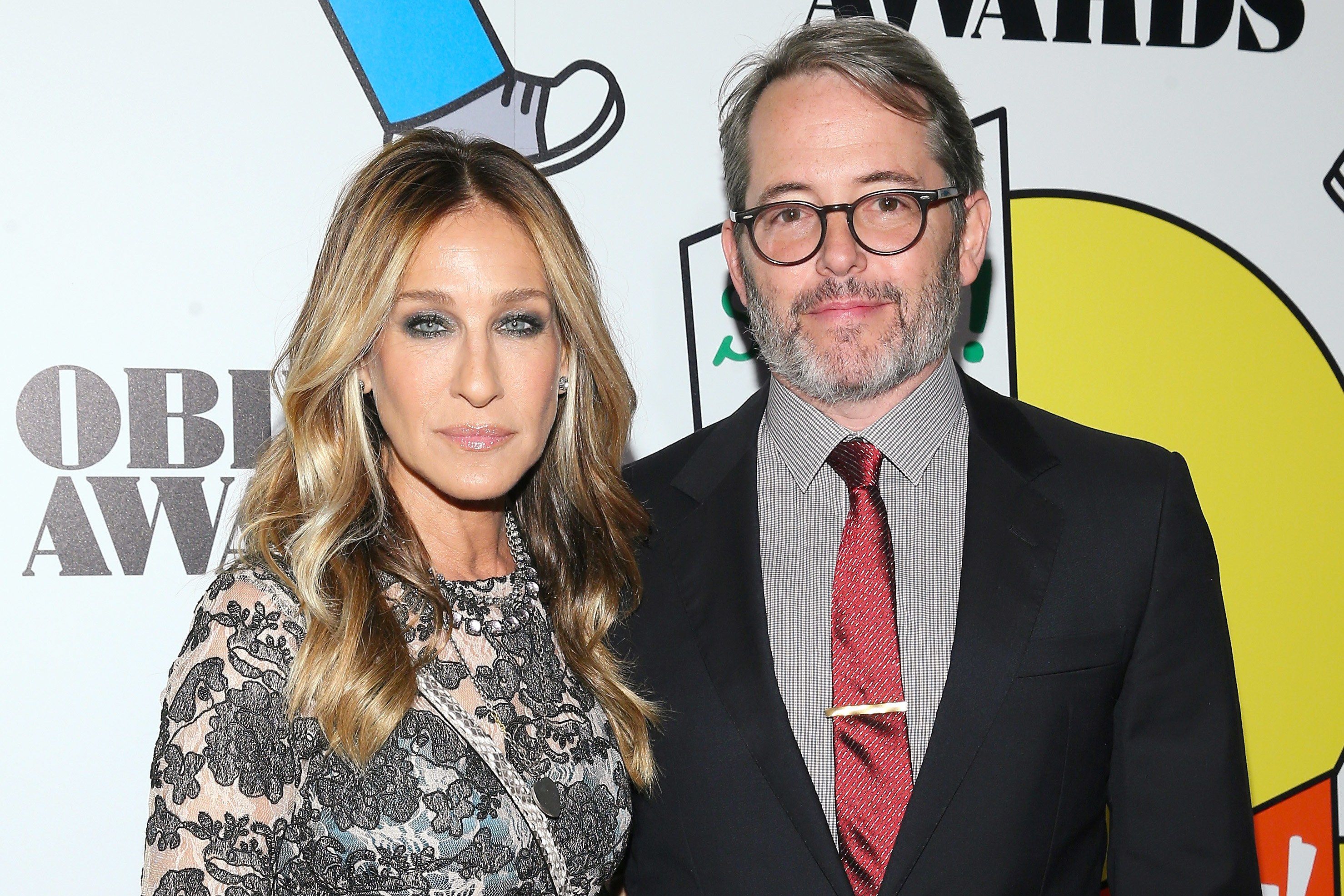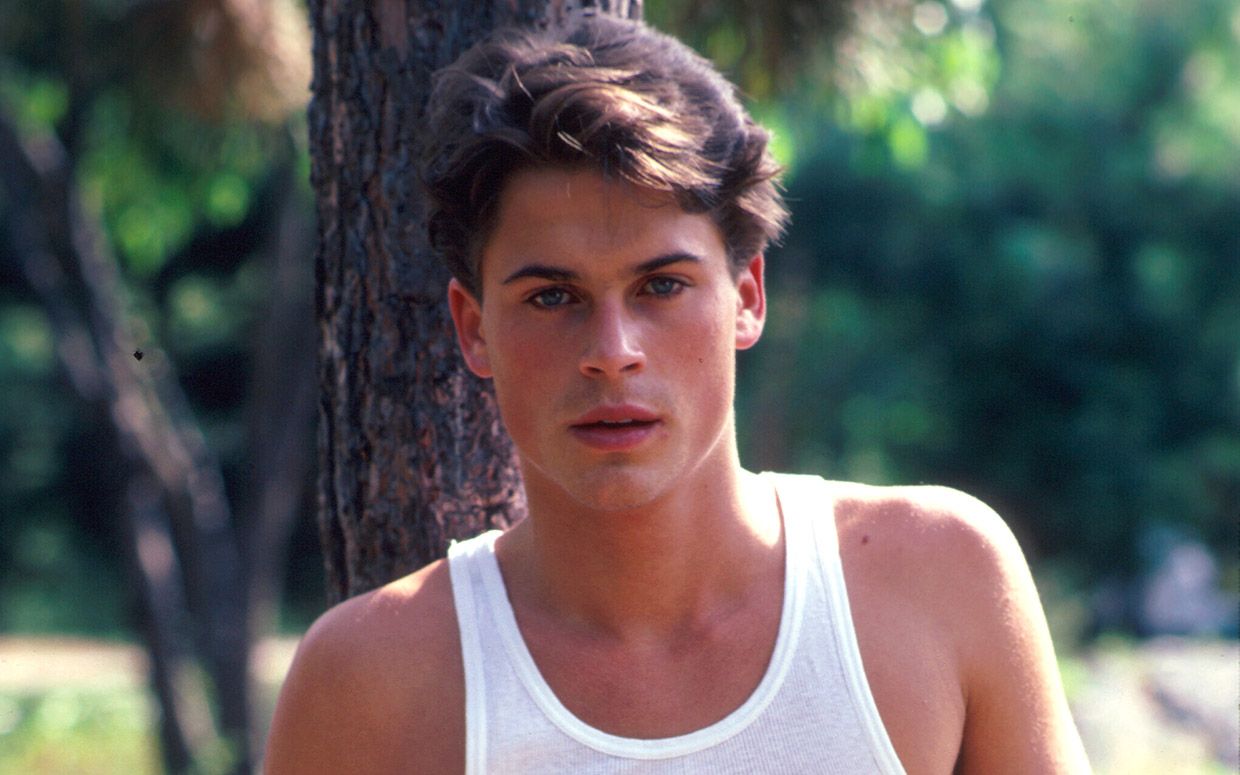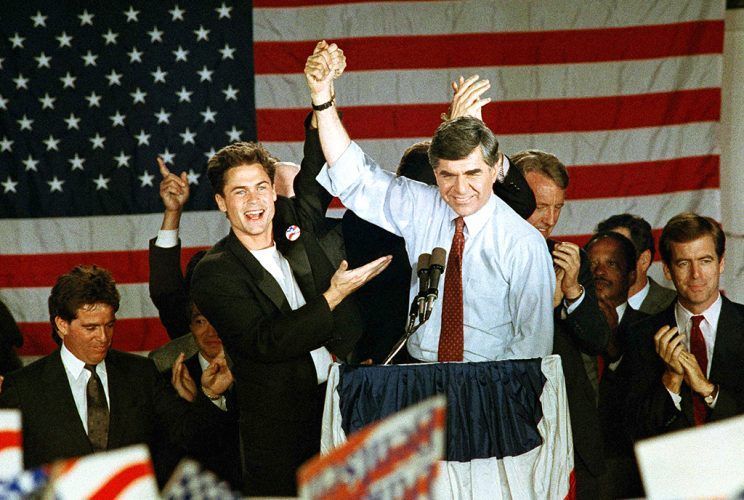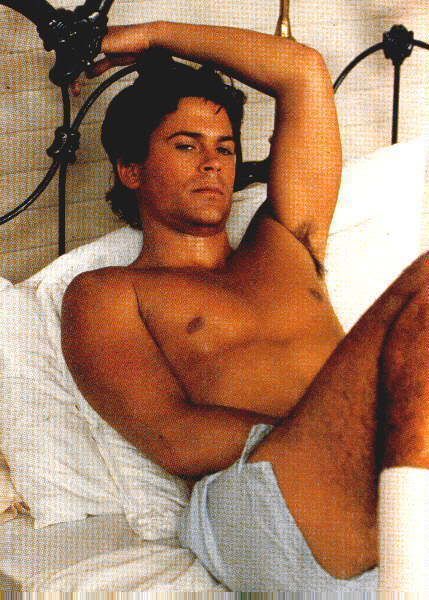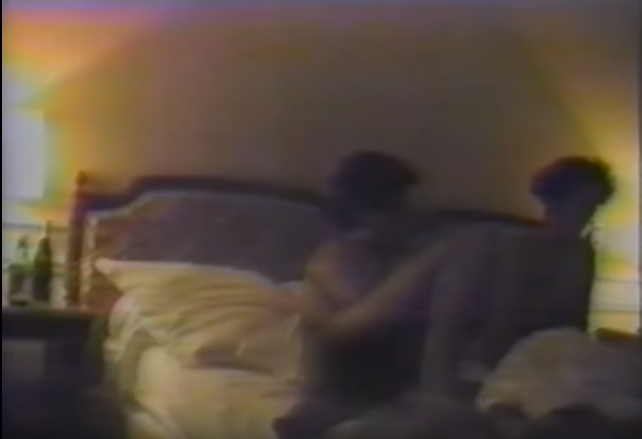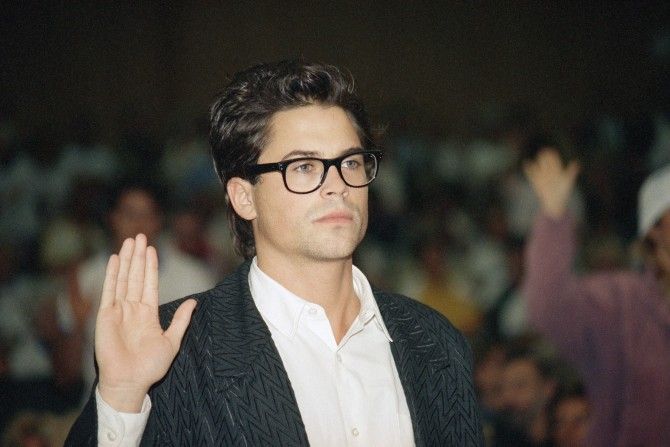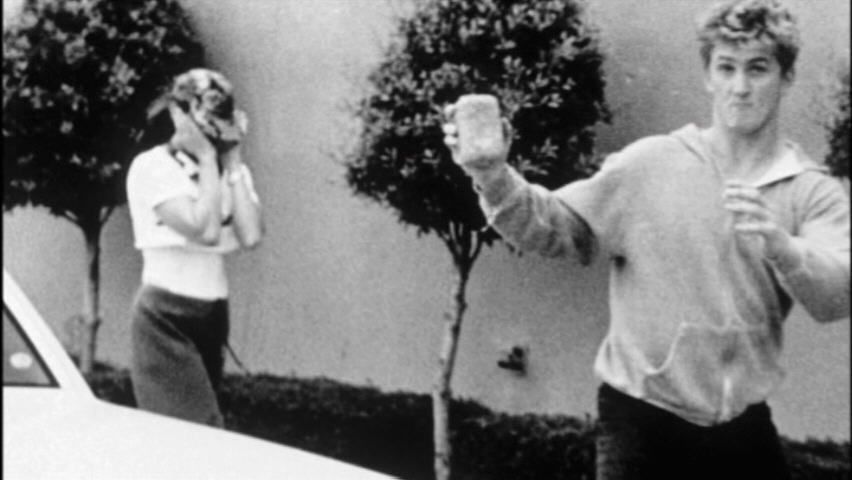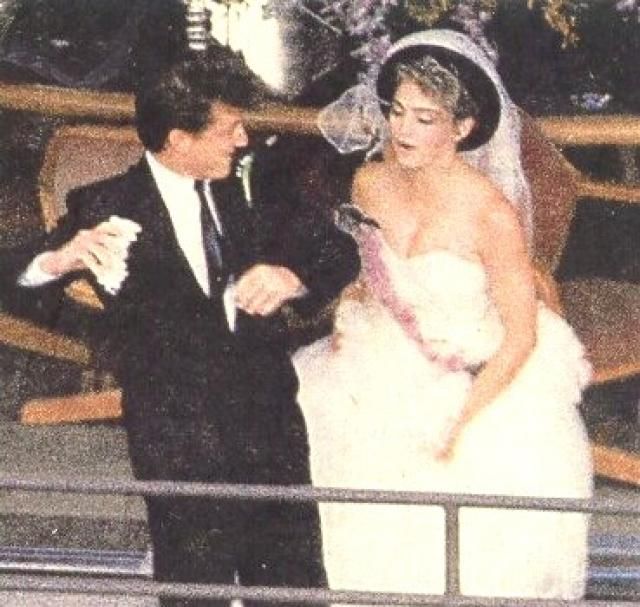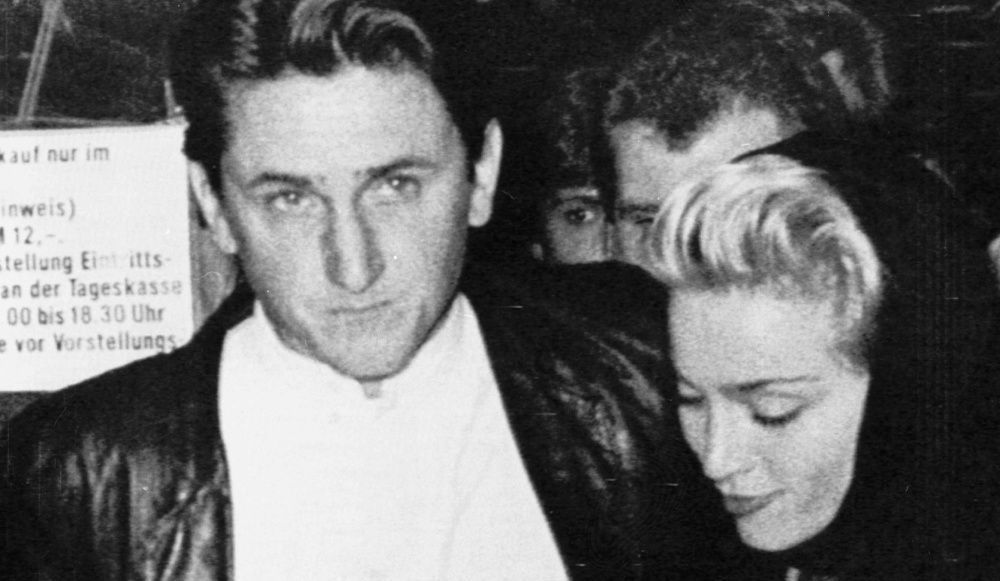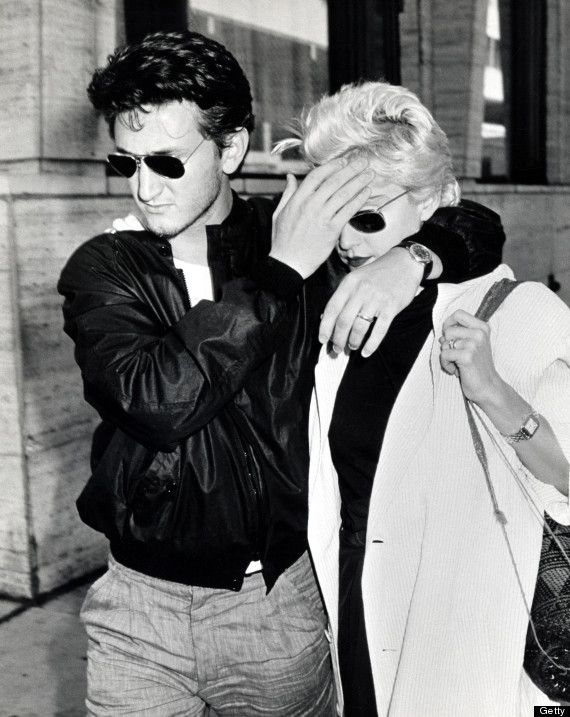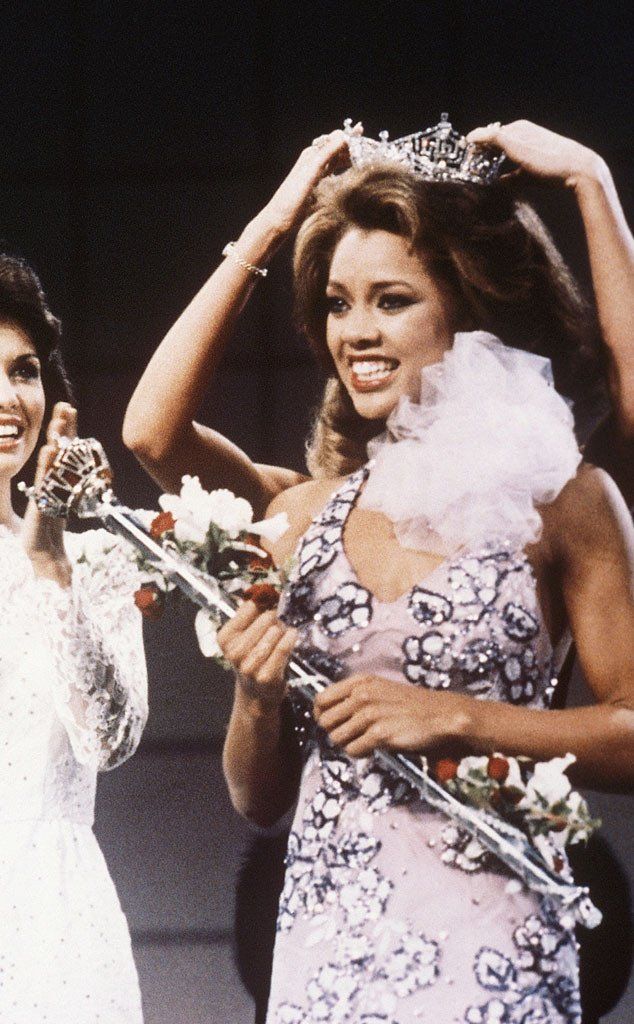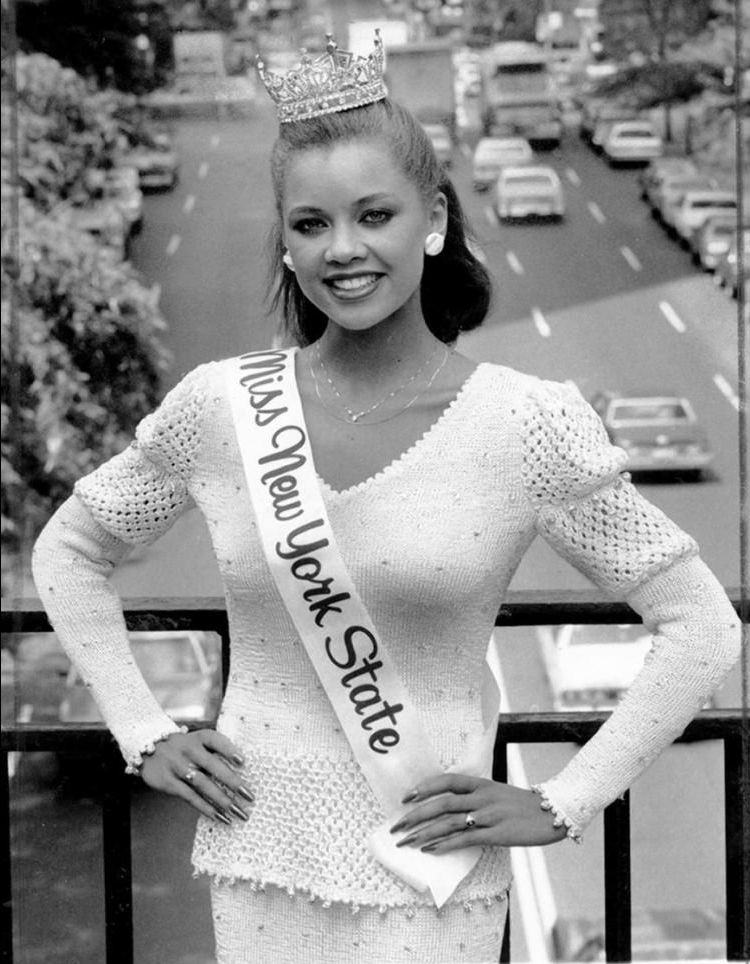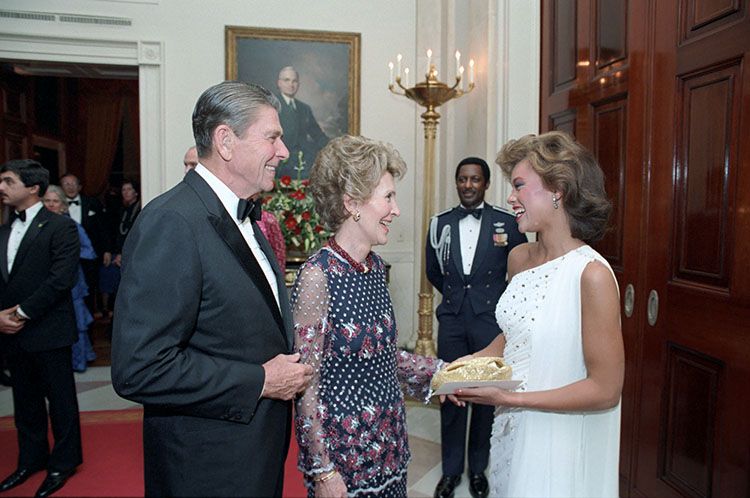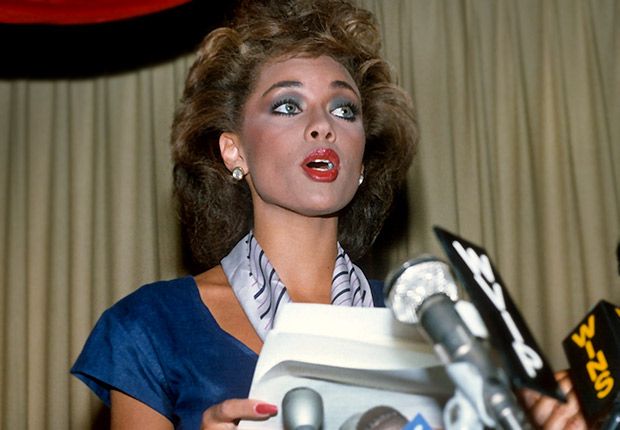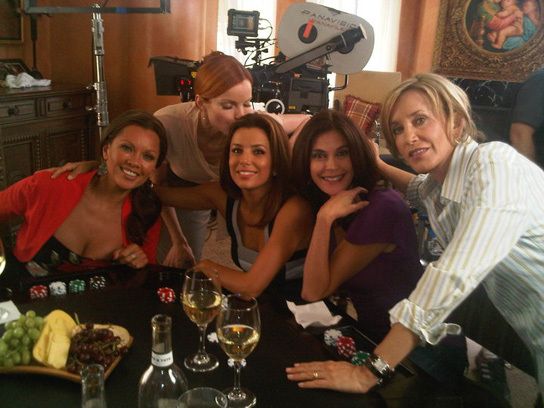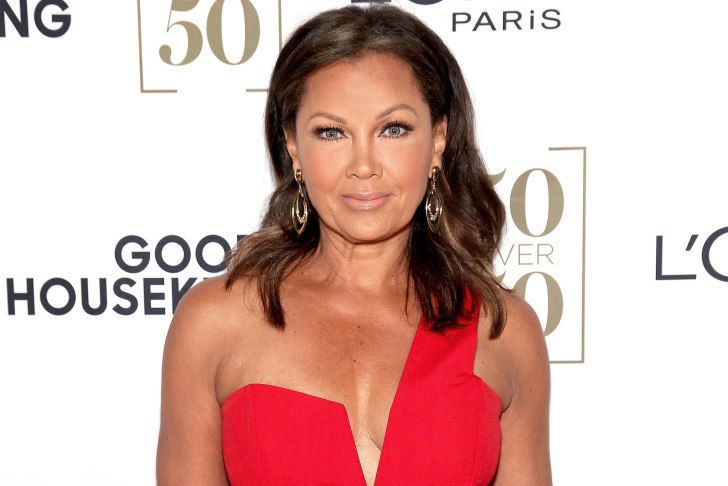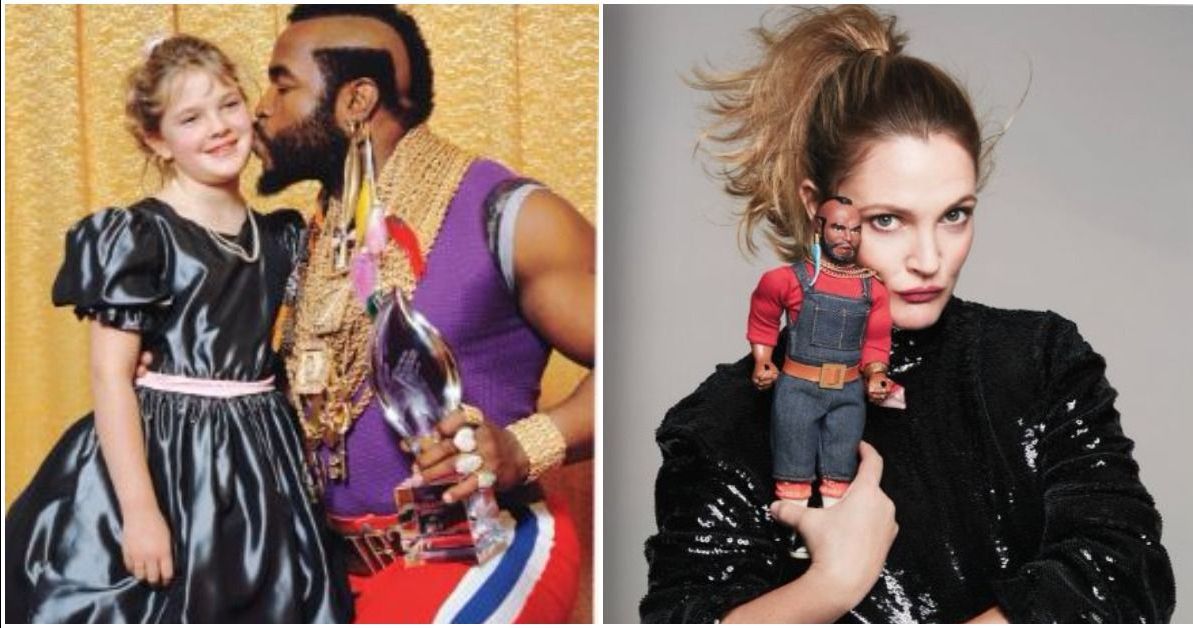
Pop Culture | Celebrities | 80s
9 Celebrity Scandals From The '80s That We've All Apparently Forgotten

Two Of The '80s Biggest Stars Were In A Fatal Car Crash And We Somehow Forgot All About It
The classic ‘80s comedy Ferris Bueller’s Day Off made true movie stars out of Matthew Broderick and Jennifer Grey, but it was also the beginning of a Hollywood romance that would thrive in secret and end in tragedy.
The couple felt an attraction on the film’s set, but kept their relationship out of the public eye. At 25, Broderick had quickly become one of the decade’s biggest stars with a string of hits including WarGames, Ladyhawke, and finally Ferris Bueller. Grey, 27, had stood out in Red Dawn, but playing Ferris’s sister Jeannie really made her a star.
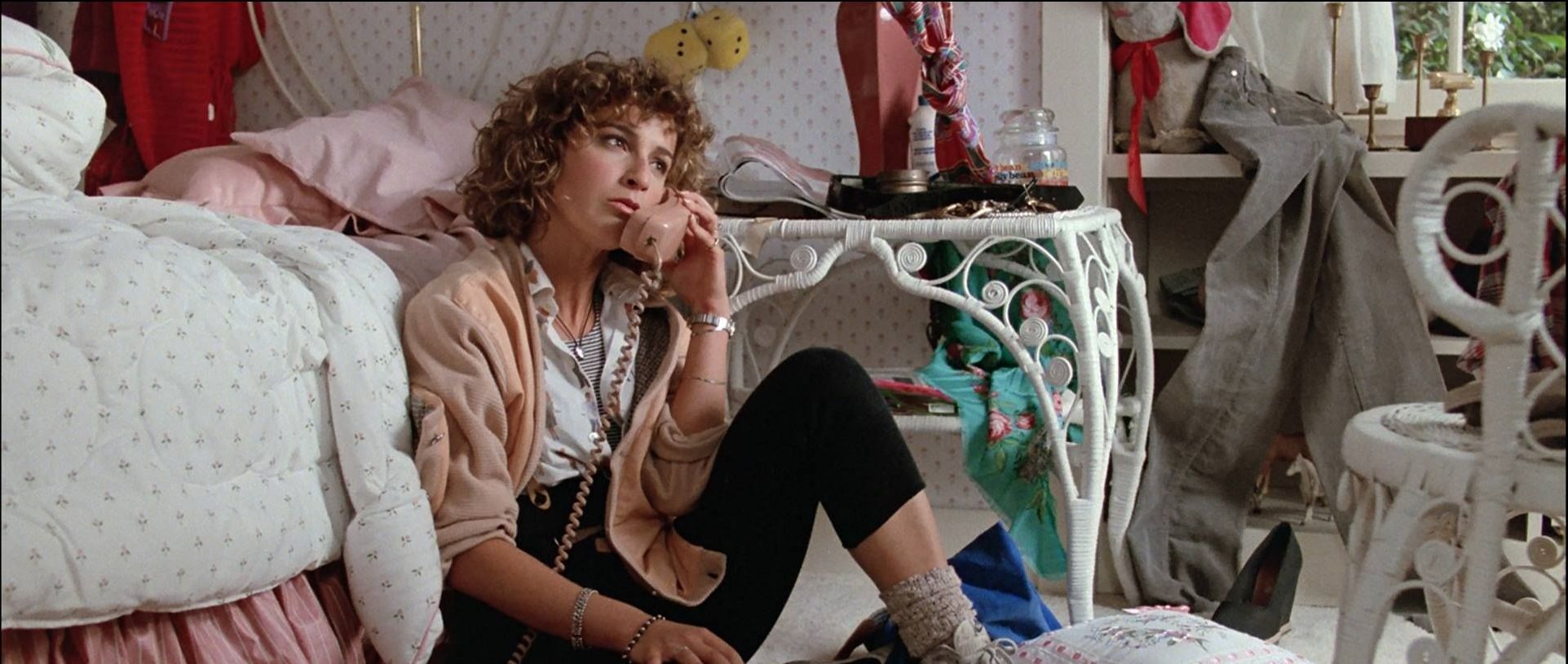
For less than two years, they were Tinseltown's secret power couple, and had to find time for their blossoming relationship in between their hit film projects. So in the summer of 1987, when Broderick had just finished shooting his latest film and Grey had free time before her tour promoting Dirty Dancing, the couple took a fateful trip to Northern Ireland.
Ireland was a favorite holiday destination for Broderick’s family, and he was introducing Grey to the country’s sights, driving her around Enniskillen in a rented BMW 316. Sadly, the young couple’s romantic getaway quickly turned into a disaster that would dramatically change four lives.
Broderick seemed to get lost along the way, pulling into a gas station and asking for directions. An off-duty police officer told the star his sightseeing route was “just stupid,” and offered to lead the couple on a tour, but Broderick refused. Shortly after, it started raining, and Broderick pulled into another gas station to get his bearings.
When he pulled out of the station, he and Grey were heading down a straight and flat road 80 miles from Dublin. From the other direction, 30-year-old Anna Gallagher was driving home, with her mother, 63-year-old Margaret Doherty, sitting beside her.
Broderick veered into the right lane (the wrong side of the road in Ireland) crashing head-on into the Volvo.
Broderick had to be cut out of the rental car, and suffered from a fractured leg, ribs, a concussion, and a collapsed lung. Jennifer Grey walked away from the crash with just a case of whiplash. But the two women in the other car weren’t so lucky; they both died from their injuries.
As a member of the local fire brigade dragged Broderick away, he reportedly asked “Did I hurt them? Did I hurt them?” over and over.
While it seems the accident was caused by Broderick’s simple mistake, the court case that followed outraged locals and the women’s family. Broderick, who had been facing five years in jail for causing death by dangerous driving, pleaded guilty to the lesser charge of careless driving, and paid just a $175 fine.
The star insisted to reporters that he had no memory of the accident, or why he drifted into the wrong lane.
"I don't remember the day,” he told reporters outside his hospital. “I don't remember even getting up in the morning. I don't remember making my bed. What I first remember is waking up in the hospital, with a very strange feeling going on in my leg."
Martin Doherty, the brother and son of the two car crash victims, called the verdict “a travesty of justice,” and later admitted that he resented the actor for years afterwards. While fans around the world worried how the crash would affect Broderick’s acting career, Doherty and his family’s pain were lost behind the headlines.
As one tabloid said about the case: “Ferris Bueller’s Let Off.”
But while the crash was forgotten almost immediately stateside, and Broderick gladly stepped back into his role as a Hollywood star, Grey never felt comfortable leaving the accident behind.
She admitted to People magazine that it was disorienting to become “America’s sweetheart within five days of the accident,” and says it took decades to recover from the survivor’s guilt.
“One minute we’re going down the road and music is playing, and the next minute…it’s all different. I couldn’t be fearless after that,” she explained. “It didn’t feel good to be the toast of the town.”
While Grey returned to show business throughout the years for small parts, and to compete on Dancing With the Stars, the actress admits that her movie career basically ended at 27 because of the crash and its aftermath.
“My head was never the same, my ambition was ever the same.”
As for Broderick, the actor admitted to Britain’s Best magazine in the early 2000s that “it was extremely difficult coming to grips with what happened, but in time I felt better about that terrible experience. Therapy helped.”
But the actor wasn’t willing to confront the past in 2002, when Martin Doherty managed to arrange a meeting with the actor during his return to Ireland. The grieving man said he had come to terms with the accident, and felt “no anger” towards Broderick, but still wanted to bury the hatchet in person.
“There was a note after the accident from him saying how sorry he was – but no other contact,” Doherty explained. He’s not even sure if the note was from Broderick, or his agent. "Of course you wonder if he got off lightly because of who he was. He got the same punishment he would have got if he'd run over cattle.”
It wasn’t until 2012, when Broderick appeared in a Super Bowl ad for Honda, that Doherty revealed the planned meeting had never happened after all.
As for Broderick’s performance in the commercial, Doherty says he "wasn't the greatest choice of drivers, knowing his past."
But Matthew Broderick wasn't the only teen icon who found himself making the news for all the wrong reasons
The True Story Behind The Celebrity Sex Tape Scandal That Started It All
Rob Lowe's first sex tape involving two young women is notoriously known to be the first-ever sex tape scandal in Hollywood.
While the "Lowe's tape" itself was shocking enough to raise eyebrows, it was the fact that the young actor broke the law that set off a media firestorm.
Lowe was a rising film star in his early twenties and inadvertently earned the title in the exclusive group known as the Hollywood Brat Pack, a nickname given to young actors who starred in coming-of-age films in the 1980s.
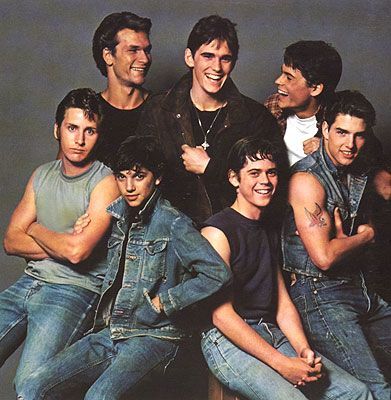
His dashing looks helped him star in critically acclaimed movies like The Outsiders, St. Elmo's Fire, and About Last Night.
Lowe was propelled into the limelight at only 24, but he wanted to be known for more than just being an actor.
What came next for the former “bad boy” was something he would have never foreseen.
The making of a sex tape
As a political junkie, he went to Atlanta, Georgia to campaign for Democratic party frontrunner Michael Dukakis at the Democratic National Convention in 1988.
But as a young star in the '80s influenced by parties, sex, and alcohol, he couldn't dissuade himself from taking a night off for some shenanigans.
He spent the night at a bash hosted by CNN founder Ted Turner, then went to the hip Club Rio on Luckie Street with Ally Sheedy and Judd Nelson.
He left the nightclub with his hands full - literally. Two young women agreed to be videotaped having sex with him in his suite at the Atlanta Hilton & Towers.
The pornographic home video first featured him having sex with 16-year-old Jan Parsons, before he moved on to have sex with 22-year-old Tara Siebert.
“I was introduced to Jan, and she introduced me to her friend Tara. They both seemed like nice enough people to me," Lowe remembered of that night.
For Lowe it was going fine and dandy until he popped into the bathroom. The girls rushed to steal his money and took the videotape, which contained a short recording that would change the actor’s life.
The release of the tapes
It was inevitable that a sex tape featuring a widely popular Brat Pack member would blow up.
By the summer of 1989, the Los Angeles Times reported that "copies of the tapes have slipped out of Atlanta and are in wide circulation around the country.”
Porn magazine editor Al Goldstein also aired a portion of the tape on his "Midnight Blue" program that aired on Manhattan's Channel J cable station.
That's when things went awry for the dashing star. He was unaware that Parsons was an underage girl at a nightclub.
Parsons's mom defended her teenage daughter and launched a civil lawsuit against Lowe for allegedly using his celebrity status to entice her daughter into making a sex tape.
Ultimately, Lowe was not prosecuted and agreed to do 20 hours of community service in his hometown of Dayton, Ohio to avoid criminal charges.
“What kind of a career does he really have (to harm)?” an executive of a Hollywood publicity firm commented on the scandal. “He is not a major star … I would think the fact that he is getting this attention will probably just make him better known to people. If it had been a gay film, it would have been a (career) killer.”
Dale Kinsella, the actor's attorney, defended the actor at the time.
"He is an extraordinarily good-looking kid. He's personable, warm and nice. You can just see how this person could attract every good and bad aspect of society."

The actor was at an all-time-low once the sex tape had been seen by millions across the U.S. He recalled that his phone stopped ringing, aside from getting calls from former co-star Jodie Foster and producer Don Simpson.
The paparazzi were camped outside his home while he drank the nights away.
“This is how I knew I was in some serious trouble: I turned on the television and I led the evening news with Tom Brokaw,” Lowe wrote in his 2011 memoir, Stories I Only Tell My Friends, "The second story literally was Tiananmen Square.”
The aftermath
Contrary to popular belief at the time, Lowe's career wasn't about to bottom out, but rather was about to be rekindled into something new, and what made this transition so simple was his attitude towards it.
“I’ve learned the importance of admitting when you have made a mistake, when you have been wrong or made bad judgments,” he said. “And I learned that you must accept the consequences of your actions. That’s part of being the man that I want to be.”

Despite all the negative criticism, Lowe has admitted that the sex tape scandal was the "greatest thing that ever happened" to him.
Of course, once the scandal broke it wasn't smooth sailing for the up-and-coming actor, but he did become one of the most talked-about celebrities in the '80s and early '90s.
In an interview with Oprah Winfrey, he said, "What it ends up doing is accelerating my alcohol [addiction] to where I finally get sober. I have been able to have the rest of my life that I'm so blessed with, which is now 20 years of sobriety.”
Now, the pornographic home video recording from the ‘80s is considered to be one of the first commercially available celebrity sex tapes.
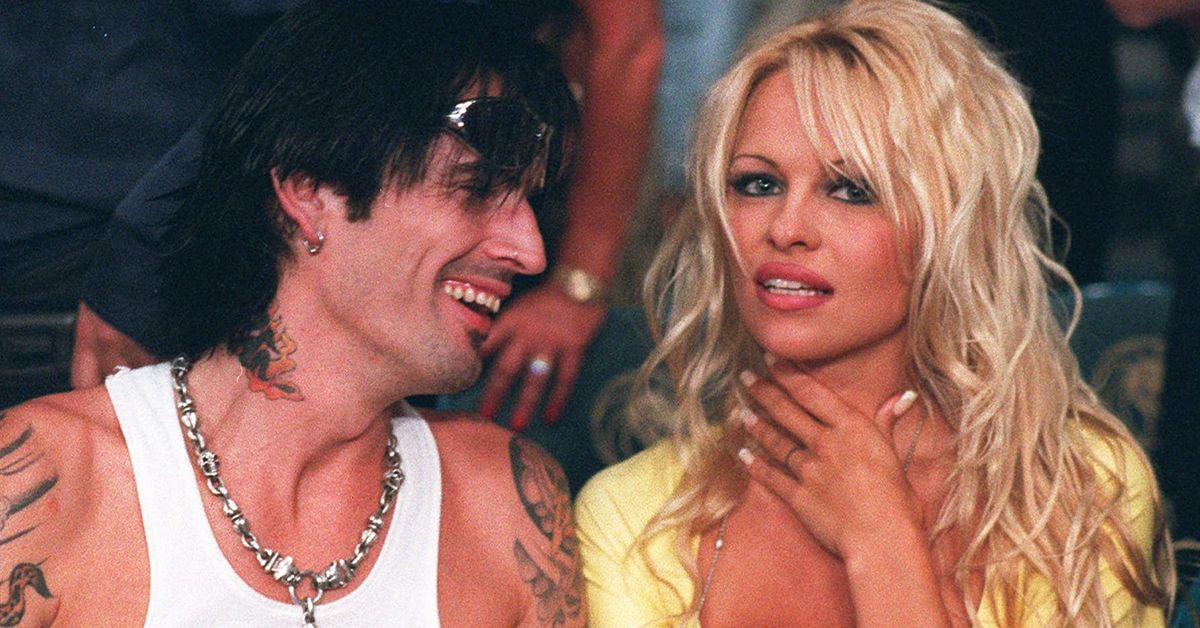
He’s also become the trailblazer for other celebrities to gain notoriety, such as former celebrity couples Pamela Anderson and Tommy Lee and Kim Kardashian and Ray J.
Rob Lowe may have been considered a bit of a "bad boy" but he wasn't as notorious as this next A-lister
We've All Heard The Rumors About Sean Penn Abusing Madonna, But How Much Of It Is True?
In recent years, many audiences have tried to wrap their head around actor and philanthropist, Sean Penn. His unusual movie roles have included Harvey Milk, the first openly gay elected official in California, to a character in a kids film, The Angry Birds Movie.
He has also done amateur-style interviews, most famously with Mexican drug lord El Chapo, at one point most wanted man in the world, before his subsequent arrest.
While he is best known for the charity work he has done in these past few years in Haiti and Pakistan, his reputation has stood in the shadow of his more violent and explosive younger years.
Despite his recent branding as a gentle individual, in the '80s, Penn was constantly in headlines for assault and battery charges against reporters and fellow industry acquaintances.
Perhaps it was ironic that Penn rose to fame after appearing in the 1983 film Bad Boys, because two years later he earned the title outright.
While in Nashville, Tennessee, the actor was accosted by two British journalists. He picked up a rock and threw it at one of them, before striking them with a camera, punching out the other. He was fined and received a 90 day suspended-sentence.
This wouldn’t be the last time the Hollywood rebel would run into trouble with the law.
While most bad-boys tend to settle down after finding a woman that charms them, it was definitely not the case when Penn began dating the famous singer, Madonna.
Their relationship was fraught with abuse of all kinds, and it was obvious from their wedding that Penn was not the typically temperate husband. Their wedding in August of 1985, months after his first public assault, Penn found himself overly-bothered by the paparazzi that were circling the ceremony in helicopters.
A few minutes after saying “I do” Penn walked into the building and returned with a gun, firing several shots into the air. He would continue to have a trying relationship with the media for the next few decades.
After their marriage, Penn and Madonna looked forward to starring in a movie together, the critically panned Shanghai Surprise. The couple were apparently fighting non-stop, and Penn acted toxically to his fellow crew and cast-mates. Notably responsible for the firing of well-liked publicist, Chris Nixon, who Penn felt was too insistent in wanting photos of the couple on set together.
This was brought to international attention when the star was charged with attempted murder of a reporter and thrown in a jail while filming in Macao.
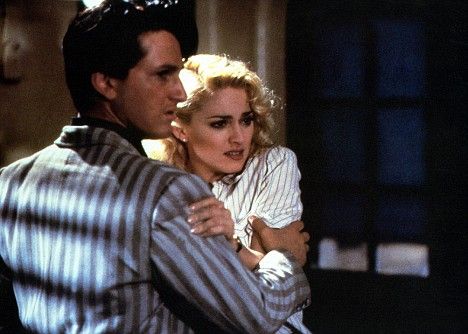
They were working on the aforementioned movie, when Leonel Barralho (a photographer) approached the husband and wife outside their hotel room. Penn claimed to have been surprised by the intrusion and grabbed Barralho, beating him with his bodyguard before allegedly holding him over a balcony and demanding he destroy the photos.
All parties quickly realized the gravity of the situation, Barralho was let go, and the local authorities threw Penn and his bodyguard in prison. They managed to escape and flee the country, though Penn later said he had been pardoned.
If you thought this would scare the tantrum-prone star to submission, you’d be wrong. A few months later, Penn and Madonna were at a nightclub in Los Angeles with several friends. Among them was songwriter and synthesizer musician, David Wolinski, who took his leave just after midnight following a seemingly normal night.
When he said goodbye to the celebrity couple, Penn accused him of trying to kiss his wife, punching him in the face and hitting him repeatedly with a chair. The actor was charged with battery and was eventually put on a two-year probation.
A year after this, Penn was filming the gangland action movie Colors, when he had a run-in with film extra, Jeffrey Klein, who was photographing him. He swore at Klein and spat on him. Klein spat back, and Penn assaulted him, punching him several times in the face until other crew members forcibly removed him.
However, this is nothing compared to the allegations that came out of the divorce between him and Madonna.
According to police reports and sources claiming intimacy with the couple, on the night of December 28th, 1989, Penn broke into Madonna’s home in Malibu after their relationship had become strained.
He allegedly berated her before saying that he owned her, “lock, stock, and barrel.” When she attempted to leave, a horror story unfolded.
Apparently, Penn grabbed her and tied her to a chair, continuing to verbally attack her. For the next nine hours, her hit her, bound her tightly to the seat, and threatened to cut off her hair.
Penn then reportedly left to buy more alcohol to drink, returned, and continued beating her. He then forced Madonna to perform a “degrading sex act” on him, before releasing her. She escaped, went to the police, and told this story to an officer on duty.
Madonna filed for divorce a week later. However, since the story went public, she has denied these allegations, and has even signed a legal affidavit expressing that this ordeal did not take place.
Since then, they have apparently reconciled their differences, and remain good friends. Penn has continued to be involved in violent incidents with fans and the press, but compared to his history, has become much more tame.
Perhaps he slowly growing out of his Bad Boys lifestyle? We shall see.
While Sean Penn was gaining a reputation for his violent temper, the way Hollywood and the fashion industry were treating a young Brooke Shields was giving her a much more unsettling reputation
Never Forget The Time A Major Brand Wanted Us To Sexualize A 15-Year-Old Brooke Shields
At one point in the '80s, supermodel and actress Brooke Shields was arguably the most famous teenager on the planet. However, her road to stardom was paved with a number of controversies.
Managed by her mother, Teri, Shields had her first taste of the limelight as a model for a soap ad at the age of eleven months. She continued to appear in ads as a toddler, and at the tender age of 10, the child model posed nude in a series of photographs taken by Garry Gross. Teri commissioned the photos in 1975 because she wanted to turn her little girl into a star.
A few years later, Shields was 12 when she made her silver screen debut in Louis Malle’s Pretty Baby (1978). That’s also when she got caught in the middle of her first scandal.
See, Shields played the role of a preteen prostitute, Violet, in the red-light district of New Orleans, and although she garnered critical acclaim, many members of the public were furious.
In an interview she gave a few years ago, Shields recalled her mother saying that as long as she liked the role she played, “then f**k ‘em if they can’t handle it.”
With her mom cheering her on, Shields landed an even more controversial role as Emmeline Lestrange in the film adaptation of Henry De Vere Stacpoole's novel "The Blue Lagoon." She was just 14-years-old at the time, but had to film a number of nude scenes. The production team found it challenging to keep her covered so they had to tape her long hair on her breasts during topless frontal shots.
The infamously sexy film shocked the audience when it premiered in 1980, and decades later, an adult Shields was implicated in some legal matters concerning child sexual exploitation.
Famed film critic Roger Ebert gave the movie 1.5 stars, and said that it "made him itch," while popular gossip columnist Rona Barrett claimed “it borders on kiddie porn.”
The negative reviews did not seem to phase the film’s director, Randal Grease Kleiser or thousands of moviegoers, who helped make it a box-office success.
“It’s an R-rated film I hope parents take their kids to see,” said Kleiser. Well, he was right. The movie grossed over $58 million in the U.S. and Canada, and even got nominated for an Academy Award and a Golden Globe.
Shields soon started appearing on the front page of newspapers and magazine covers, including The New York Times and People. All of these publications addressed Shields’s underage nudity, and the notorious sex scene that scandalized viewers.

The film's creators and Shield's later testified in front of U.S. Congress that many of her nude scenes were done by a body double.
"You sort of desensitise yourself to anything sexual. In Blue Lagoon, I’m using a glue gun, taping my hair, anything I can so my body doesn’t show I have boobs," Shields said in an interview with The Guardian. And I didn’t realise I was doing it, because I was a kid. I was in a cocoon with my mom.”
However, amidst all the frenzy, Shields’s stage mother was negotiating a modelling contract for a provocative campaign that would change her life forever, and turn her into a household name for years to come.
In 1980, Shields’s mother signed a career-boosting opportunity for her daughter to appear in a series of Calvin Klein ads. At the time, Klein was the first high-fashion designer to launch a diffusion denim line, so Shields had a unique opportunity to make an even bigger name for herself by being the face of the company.
However, what many people did not expect was the overtly sexy print advertisements and commercials that would follow.
Photographer Richard Avedon took a series of snaps of a 15-year-old Shields posing in interesting positions while wearing the skin-tight designer jeans. Some of these photos were then accompanied with provocative tag lines, including one where Shields asks, “Do you want to know what comes between me and my Calvins? Nothing!”
Not everyone was on board with these campaigns and the commercial was immediately banned by ABC and CBS, because network executives and some viewers believed the ad was insinuating that an underage Shields wasn’t wearing any underwear, which was deemed inappropriate.
When Klein was asked why he opted to market his denim line in that fashion, he replied, “Jeans are sex.” He added, “The tighter they are, the better they sell.”
He wasn’t exaggerating when he made that famous statement. The buzz-worthy campaigns featuring Shields helped the brand rake in $2 million in sales every month, according to Vogue. The iconic too-sexy-for-TV ad became cemented in popular culture, and even today, it is referred to as “one of the most memorable commercials ever.”
Just when Shields and Calvin Klein thought the hype had died down, the Justice Department launched an investigation into the brand’s exploitation of underage models. The case did not get much traction and was eventually dropped.
What all these controversies really did was help the young model and starlet catapult to fame. She became of the world’s biggest celebrities, but she admitted that she is “still kind of shocked” that the ad campaign “became so legendary.”
“For me, it was just a huge job I went to after school at 3 o’clock. The one with my leg up, I just remember my arm hurting,” Shields told New York Post. “You can’t plan on being iconic.”
She also still can’t wrap her mind around why people were so appalled by her pose and tagline.
“The controversy [over saying ‘You wanna know what comes between me and my Calvins? Nothing.’] didn’t surprise me because I’d had experience with it since I was 11,” Shields admitted. “The pants came above my belly button—even the one with my shirt open, you didn’t see anything. Compared to the things I’d done before, this was like being in winter gear.”
Compared to print ads and commercials today, Shields’s Calvin Klein campaign would very likely be acceptable. But no matter how much time has passed, underage nudity will always be frowned upon, and that’s something she’s been living with all these years.
Despite the controversy, those commercials helped make Brooke Shields a fashion icon. But in that same decade, a music icon got more than he bargained for while visiting his mistress...
The Lionel Richie Love Triangle That Literally Got Him "Drop-Kicked"
The arrest of Brenda Harvey-Richie was a big scandal in the '80s, and to this day there are still questions surrounding it. The now ex-wife of the iconic Lionel Richie was definitely arrested, but it's the why that got people talking.
Their Relationship
In 1975, Lionel married his highschool sweetheart, Brenda Harvey. The couple were the epitome of true love, and people thought they would last a lifetime. Together, the couple adopted their first child, Nicole. Nicole's biological parents were unable to provide for her, so when she was three years old, they agreed to let her move in with the Richies.
"My parents were friends with Lionel," she said. "They trusted that they would be better able to provide for me."
The couple were thrilled to have a child, but that's about where the happiness ended.
The Affair
In 1986, Lionel Richie began having an affair with Diane Alexander, who was a dancer at the time. According to friends, the couple met at the 1984 Olympics, where Lionel had performed "All Night Long" at the closing ceremonies. That performance that was seen by more than 2.6 billion people in 120 countries. She also appeared in his 1986 music video for "Dancing On The Ceiling."
Lionel and Diane were pretty hot and heavy for years, and according to neighbors, he snuck out to see her at her apartment constantly.
“He parks in the back and walks right by my window all the time," one neighbor claimed.
In 1988, Lionel Richie filed for divorce from Brenda. Clearly, she was not who he was looking for. Friends said that for a year before their official separation, Lionel and Brenda were living separately.
“It’s been pretty intense for the last year,” a friend said at the time. “Obviously, things aren’t too good at home.”
The Arrest
In what can only be described as chaotic at best, Brenda Harvey-Richie found herself in cuffs after confronting Lionel on his affair. Brenda must have had suspicions about her husband's infidelity, as she just so happened to show up to Alexander's apartment at 2 a.m., only to find her husband there.
Allegedly, Brenda drop-kicked Lionel in the "stomach area", which only makes sense if his "stomach" is about 6 inches lower on his body than everyone else (if you catch my drift). Lionel fled the scene, which is when Brenda turned her attention to Diane.
Neighbors called police after they heard "a woman screaming", and officials say they walked in on an assault in progress.
"Our officers arrived in less than a minute, observed suspect Brenda Richie striking and kicking the victim on the floor of the apartment," Lt. Robert Curtis said. "A second victim, entertainer Lionel Richie, later phoned and stated to officers he had been kicked in the stomach area by Mrs. Richie (at the apartment)."
“They were screaming and you could hear everything,” said Francies Devinney, a neighbor of Alexander’s. “Lionel was there, and it was obvious that his wife had just found him with Diane. His wife was really, really mad. Glass broke and furniture crashed around inside. It sounded like she was killing someone. It wasn’t very civilized.”
Brenda's friend, Sandra Moss, described her as “very soft-spoken. She’s just the most adorable, caring, pretty, bright...I can’t believe she did this.” Though she may have been soft-spoken, she was clearly not soft-fisted.
“They had to push her down on her chest on the ground to get the cuffs on her,” another neighbor said. “She kept screaming for Diane to help her; she kept screaming, ‘Diane, don’t let them do this to me. Please, Diane.’”
Brenda Harvey-Richie was booked on suspicion of corporal injury to a spouse, resisting arrest, trespassing, vandalism, battery and disturbing the peace. She was released on $5,000 bail.
The Aftermath
Clearly, despite his wife's best efforts, Lionel didn't have endless love for Brenda. The couple divorced in 1993, and he went on to marry Diane Alexander in 1995. They had two kids together, Miles and Sophia, but that marriage ended eight years after it started.
Lionel Richie has gone on record saying that his ex-wives have ruined marriage for him, and that he has no intention of ever getting married again.
"I've no idea to go there a third time - women have killed it for me," the entertainer said in 2016. "Kids aren't the problem - ex wives are. That's why I won't marry again, but I'm happy to commit in other ways."
Lionel Richie didn't get his "Endless Love," but he's probably glad his "scandal" wasn't anywhere near as bad as the one this rock icon found himself in
He Invented Rock 'N' Roll, But Chuck Berry's 'Ding-A-Ling' Turned Him Into A Peeping Tom
When it comes to leaving a lasting legacy, very few people can hold a candle to the musical prowess of the late Chuck Berry.
Born on October 18, 1926, the Grammy Award winning artist was renown for being a pioneer of rock and roll music, where the critical acclaim he received often overshadowed his scandalous behavior, and illegal activities.
Despite the recent media scrutiny to the sexual predators of Hollywood, in the past many men would take advantage of their position of power, and get away with their vile behavior in the eyes of the public. Even if it resulted in suffering from the legal consequences that may have hindered their career.
Berry was one these men.
He was only a teenager when he was sentenced to three years in prison for armed robbery, but that didn’t stop him from achieving stardom. Nor did it deter him from having another brush with the law.
In 1959, Berry was at the height of his career. However, that didn’t stop authorities from arresting the musician in St. Louis, Missouri for taking 14-year-old Janice Escalanti across state lines for “immoral purposes.” He would serve 20 months in prison for his crime.
Fellow performer, Carl Perkins said he believed prison had severely impacted Berry in a thoroughly negative way.
“He had been an easy going guy before, the kinda guy who’d jam in dressing rooms, sit and swap licks and jokes. [But] in England he was cold, real distant and bitter,” Perkins said.
Fast forward two decades later and Berry would be behind bars once again after he pled guilty to tax evasion. In July 1979, he was sentenced to four months in jail and 1,000 hours of community service. Luckily, performing benefit concerts could be counted towards that.
After three convictions, you would think Berry would become a law abiding citizen, but sadly that wasn’t the case. The man with seemingly everything wanted something more, something that was illegal.
In December 1989, Berry was accused of recording women in the bathroom of his restaurant, The Southern Air in Wentzville, Missouri. Hosana A. Huck, the restaurant’s former waitress, sued Berry and said he had been making the videotapes "for the improper purpose of entertainment and gratification."
The lawsuit claimed Berry had installed videotaping equipment in the restaurant’s bathroom, and had “intentionally and without just cause or excuse intruded upon Huck's seclusion and privacy without her permission by surreptitiously making or manufacturing videotapes depicting Huck undressing and dressing and using the toilet at the restaurant.” It also called the recordings ''outrageous, beyond all possible bounds of decency.''
Huck claimed she had suffered emotional distress, embarrassment and humiliation. She sought out unspecified damages.
Berry claimed the cameras weren’t installed to spy on his employees or customers, but rather to catch a staff member stealing from his business.
With the lawsuit still looming over his head in the new year, things only got worse. Police believed he had been involved in a multimillion dollar drug ring, by helping smuggle cocaine in his guitar case.
However, the police didn’t find any cocaine, but rather only about two ounces of pot, some hashish, two rifles, a shotgun, and more than $122,000 in cash.
But they would later uncover a significant cache of pornography, which included dozens of videotapes, slides, and books - some of which showcased underage girls. He was promptly charged with possession of marijuana and three counts of child abuse in relation to having ownership of the pornography featuring underage girls.
Berry then sued the county prosecutor, William J. Hannah for filing “malicious and politically motivated charges.” The singer eventually accepted a plea deal, which dismissed his child-abuse charges. He was sentenced to two years of unsupervised probation and ordered to pay $5,000 to a drug and alcohol rehabilitation program.
In 1993, Spy Magazine published an exposé on Berry’s supposed perverted activities, confirming his indecency.
A tirade of women came together to file a class action lawsuit against Berry for filming them in the bathroom without their consent. Spy reported one camera “was evidently behind the toilet seat,” while the other recording devices captured “aerial views of the toilets contents during the seconds after the women stood but before they flushed.”
The videos were dubbed the “toilet tapes” by the media, as they showed hundreds of females caught “relieving themselves.”
“Sometimes the frame [was] frozen for a few seconds, lingering on moments that must have been considered particularly moving,” Spy reported.
In 1994, Berry’s legal troubles were finally resolved as he settled his lawsuits by paying more than $1.2 million to the group 59 plaintiffs, including Huck.
Berry passed away earlier this year on March 18, at the age of 90. Despite his disturbing criminal history, he is still remembered as a legend in the Rock & Roll Hall of Fame.
Chuck Berry's habit of filming women without their consent didn't seem to affect how the world saw the "Father of Rock." Meanwhile, one Miss America winner was about to lose her crown thanks to her own photos being published without her permission.
The Truth Behind The Scandalous Photos That Cost Vanessa Williams Her Miss America Crown
In 1984 Vanessa Williams was crowned Miss America, making her the first black woman to successfully win the title. She swept the preliminaries, beating out other women in the swimsuit competition as well as the talent portion by singing “Happy Days Are Here Again”.
Even though she won the contest fairly, she was criticized because of her skin color. She stated that “there were a lot of people that did not want me to be representative of the United States and Miss America.” It wasn’t only the white population who were upset with her win. “There were a lot of people who had issues. I was too light. My eyes were the wrong color. My hair wasn't the right texture and getting criticism for being who I was,” Williams said.
But the hateful attacks weren’t the only thing the young woman had to deal with. About two months before the end of her reign, Williams received word that nude photos of her were going to be published in Penthouse. She had no control over the photos, had given no consent to the magazine to run them, but apparently that wasn’t going to stop them.

Williams wrote an essay talking about everything that happened, and how these pictures even came to be. She revealed that it all started when she was looking for a summer job in between semesters at Syracuse University.
“I saw an advertisement in a local newspaper reading 'models wanted,' so I called up and talked to Tom Chiapel, who was the photographer and part-owner of TEC studios. He said to come down for an interview,” Williams wrote. “I went to the studio and he said that I would need a portfolio. I asked my parents and they agreed to put up the money. It was a little over $100. My dad gave me a check. When I returned later to pick up the proofs, Tom Chiapel indicated that he needed a makeup artist. He offered me an audition, so I came in and did a face. He decided to have me work for him as a makeup artist-receptionist.”
She worked for him full-time, and Chiapel asked her multiple times to pose nude for him. Williams was only 19 years old at the time. “He assured me that none of the photographs would ever leave the studio. He assured me. I did a photographic session by myself,” Williams wrote. “I felt uncomfortable and awkward when I saw the proofs. I didn’t bring them home because I didn’t want anyone to see them.”
After a week, Chiapel asked her to pose again, this time with another model. He claimed it was for silhouettes. “The light would be behind the models. I was reluctant, but since he assured me that I would be the only one to see them and I would not be identifiable in the photographs, I agreed. He had also gotten another model to agree to this.”
She said, “The shots were posed. There was no activity throughout the whole session between me and the other model. The session lasted maybe an hour. That was the extent of it. When I saw the printed negatives on the contact sheet, they were in silhouette form. There was no way that either of us could be identified. That’s the bottom line.”
She never signed anything to release the photos. “I trusted him not to do anything with the photographs. That was my error,” Williams wrote. “I did not give my consent to him or Penthouse to ever have them published, used in any magazine or in any way. Nothing. I signed an application giving my height, weight, color of hair and my talents.
She left the studio on good terms, not knowing what would happen two years later. She never told anyone about the pictures until the rumors started to come up, and then she felt completely betrayed. “I feel as if I were just a sacrificial lamb. The past just came up and kicked me,” she wrote. “I felt betrayed and violated, like I had been raped.”
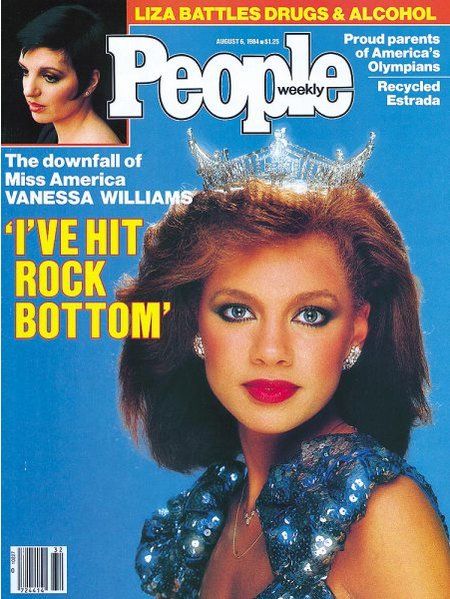
Williams revealed that it was “the worst thing that has happened in my life,” but she wasn’t going to give up. “I can’t go any place but up. I’ve hit rock bottom.” She was pressured by the Miss America Organization to step down as the reigning Miss America. She only had two months left to go before a new winner would be crowned, but they didn’t want their name tarnished.
Shortly after the scandal broke, Williams launched a lawsuit against the photographer who sold the images of her. The $400 million lawsuit was filed against both Penthouse magazine and Tom Chiaped, but only a year later Williams ended up dropping the suit. “It was a no-win situation,” says Williams,. “Besides, I didn’t feel like reliving all this stuff again, five years down the line. I just wanted to get on with my life. So many people have gotten burned by those people that I think they’ll eventually get it in the end and die a slow, painful death.”
After the scandal, she decided that she wasn’t going to let it stop her from continuing on in her career. She released a successful album and she started acting. You might remember her from the shows Ugly Betty or Desperate Housewives, or from the 2000 remake of Shaft with Samuel L. Jackson.
Recently, the Miss America Organization actually took it upon themselves to apologize to Williams for forcing her to step down. During the 2016 pageant, executive chairman, Sam Haskell, made a public apology to the former winner. “You have lived your life in grace and dignity and never was it more evident than during the events of 1984 when you resigned,” Haskell said. “Though none of us currently in the organization were involved then, on behalf of today’s organization, I want to apologize to you and to your mother, Miss Helen Williams. I want to apologize for anything that was said or done that made you feel any less than the Miss America you are and the Miss America you always will be."
It took the organization over 30 years to forgive Williams for something she had no control of at the time. Luckily Williams has been able to move on with her life and come out stronger than before. “Obviously I’m more seasoned and less trusting, and—I don’t want to say bitter, but a little harder,” she said.
It took 30 years for Vanessa Williams to get the apology she deserved, but there's one rock star who's proven that there are some scandals so infamous that the world won't let anyone forget it happened
Ozzy Osbourne Went Off The Rails On A Crazy Train And Gave Us The Most Infamous Moment In Rock History
When it comes to icons in rock and roll, you'd be hard-pressed to find one more revered (or borderline insane) than Ozzy Osbourne. Best-known to teens of the 2000s as a reality TV father of a dysfunctional family on MTV, the singer has a discography of influential work that most musicians would kill to say they were responsible for.
Even at the age of 69, he continues to tour on a schedule that most younger bands couldn't hope to match, and his status as "The Prince of F***ing Darkness" (as he refers to himself) is concrete. But what exactly was it that caused him to gain as much infamy as he did?

The Man
Born John Michael Osbourne in the bombed-out industrial town of Aston, Birmingham, England, in 1948, Ozzy was the son of a factory worker mother and toolmaker father, living in a small two-bedroom house alongside his three older sisters and two younger brothers. The after-effects of World War II were readily visible in the town, and it would have a significant impact on his music.
Ozzy decided he wanted to be a rock star after first hearing "She Loves You" by The Beatles on the radio, and after several odd jobs and a stint in prison for robbery (seriously), he and his friend (and bassist) Terry "Geezer" Butler formed the band Rare Breed.
This band soon disbanded, but the two quickly formed a new one, Polka Tulk Blues, which was soon renamed to Earth after they added guitarist Tony Iommi and drummer Bill Ward. The band had little success at first, until they started performing one song in particular; "Black Sabbath," named after the Mario Bava horror film of the same name.

The band changed their name to match the song and soon began shifting their sound toward its heavier, darker vibe, and success came very soon afterwards. Black Sabbath had a string of massive hit records one after the other, and were considered by many to be the founders of this new form of music called "heavy metal."
Even more legendary than their music was their tolerance for substances, and after several years of touring and partying, Ozzy was fired from Black Sabbath due to his unreliability when it came to performing. This would only bolster his desire to perform, and he soon began a massively successful solo career, with hit albums like Blizzard of Ozz and Diary of a Madman.

The Legend
It was around the release of Diary of a Madman in 1981 that Ozzy really managed to start finding himself at the center of controversy, largely thanks to his near-constant state of inebriation. After signing a deal with CBS Records, he attended a meeting with the label's executives, during which he had planned to release doves as a sign of peace.

However, in his inebriation, Ozzy instead grabbed one of the doves and bit its head off, spitting it to the ground with blood still dripping out of his mouth. It was shocking and unexpected even for him, and while it was the first time he had committed such actions with an animal, it wouldn't be the last, or even the most infamous.
In the span of a year, Ozzy and controversy would meet face to face once again. During a performance at the Veterans Memorial Auditorium in Des Moines, Iowa, Ozzy was surprised to find something tossed up on stage by one of the concert’s attendees. Upon examination, it was revealed that someone had thrown some kind of bat onstage, which the singer insists he believed to be made of rubber.
Doing what I’m sure made sense at the time (at least to his drug and alcohol-addled mind anyway), Ozzy reached down and grabbed the bat, then proceeded to stick it in his mouth and bite down on its neck. It was at this point that history was made, as it turned out that the bat was not only very real, but that it was also still alive and had just been stunned by the stage lights.
The bat proceeded to (understandably) panic and begin thrashing and biting as its head was bitten off, while a shocked Ozzy felt teeth sink into his lips and his mouth fill with blood. The show continued on from there, but afterwards he was rushed to the hospital and tested for rabies.
The bat incident has since become one of the most legendary moments in rock and roll history. It solidified Ozzy’s reputation as one of the scariest people to parents who thought his music was literally the tool of the Devil, and has since been parodied countless times by shows, other bands, and even the Ozzman himself. It’s often imitated, but never repeated, and it lives on as just one of many insane controversies found in rock music.
Oh, and he urinated on the Alamo the same year too. But that’s another story entirely.
As notorious as Ozzy's bat encounter has become, a shocking murder was about to become not only music's biggest scandal of the decade, but also among the biggest in music history
The Infamous Murder That Shook The Music Industry And Ended The Career Of One Of Music's Biggest Stars
At the peak of his career the “Prince of Motown” had his life taken away by the person who gave him that life in the first place.
After his soulful voice brought us hits like “How Sweet It Is (To Be Loved By You)” and “Mercy Mercy Me (The Ecology)” the singer with a 25-year recording career wouldn’t give us another hit.
On April 1, 1984, Marvin Gaye was shot and killed by his own father, just one day shy of his 45th birthday.
The physical cause of Gaye’s death was straight-forward, ”Gunshot wound to chest perforating heart, lung and liver,” according to the Los Angeles County Coroner, but the events leading up to his death were much more tangled.
The Grammy-winning singer who topped charts with is classics, including “I Heard It Through The Grapevine,” shocked the world with the news of his death.
Gaye grew up in Washington D.C. singing and playing the organ in his father’s church. He joined the Army at the age of 17. After his stint in the army, he moved to Detroit where he was hired as a drummer by Motown Records founder Berry Gordy.
Personal problems in Gaye’s life wreaked havoc on his career in the mid-70s.
Gaye and his father had a longstanding conflict that dated back to his childhood.
Marvin Gay, Sr. was a preacher in the Hebrew Pentecostal Church and upheld a strict moral code that he brutally enforced with his four children.
He was also reportedly a hard-drinking cross-dresser who struggled with his own moral code.
It was said that Marvin Sr. held significant resentment over his son’s success, and Marvin Jr. clearly had unresolved feelings towards his father’s abuse.
"Marvin's relationship with his father made him who he was. His need to be successful, find love and then take drugs were all down to it. No matter what he achieved with his songs, all he got was resentment and criticism," Steve Turner, Gaye’s biographer. Marvin Gaye added the "e" to his surname after "Gay" prompted jibes about his sexuality, a sensitive subject given his father's proclivity for cross-dressing.
The final time the father and son saw each other was in the Los Angeles home of Marvin Sr. and his wife Alberta.
The international recording star had moved into his parents’ home in late 1983 at a low point in his life when he was struggling with depression, debt, and cocaine abuse. Only a year after his chart-topping single “Sexual Healing,” Marvin Jr. was not in a good place. After the breakup of his second marriage to Janie Hunter, he once tried to kill himself by ingesting more than an ounce of cocaine.
"Marvin was made totally paranoid by drugs at the end. He had people testing his food and water, and bodyguards with sub-machine guns in adjacent hotel rooms," Turner said.
After an argument between the father and son escalated into a physical fight, Marvin Sr. went into his bedroom while Alberta Gay was trying to calm her son down.
"His life was in a terrible state. He'd lost the women who were important to him. All the evidence I've found is that Marvin provoked the incident because he knew what the result would be," Turner said.
He returned with a revolver that was given to him by Marvin Jr. and shot his son three times in the chest.
Police found the father sitting on the front porch and the five-shot handgun on the front lawn.
Marvin Gaye’s brother, Frankie, lived next door and was there during the singer’s final moments. He later wrote his memoirs and said that in Marvin Jr.’s final moments he revealed a telling statement.
“I got what I wanted….I couldn’t do it myself, so I made him do it.”
Marvin Sr. was convicted of voluntary manslaughter and given a six-year suspended prison sentence.
14 years after he shot his son, he died of pneumonia in hospital at the age of 84.
Source: History.com / Independent / NY Daily News
